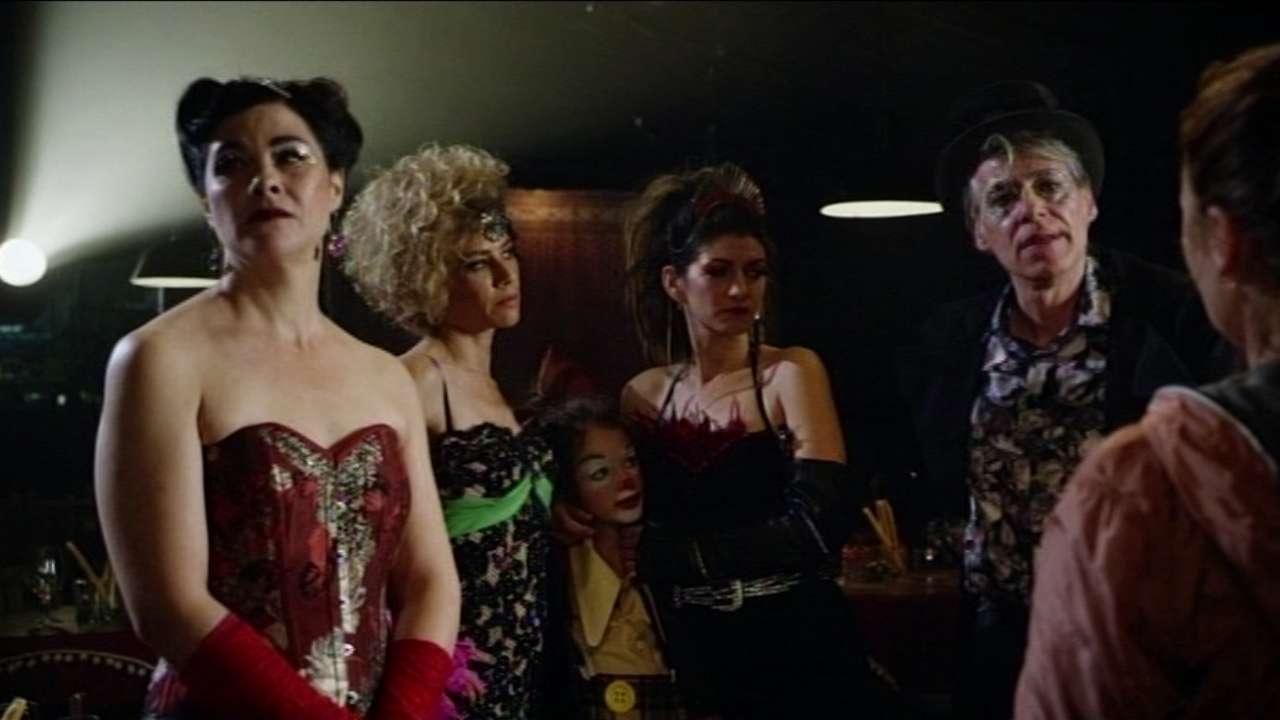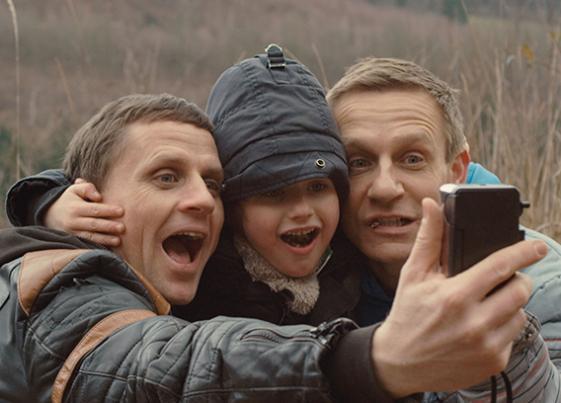
Rainbow families start to colour Swiss media

Gay or lesbian parents are almost non-existent in the Swiss mainstream media, unlike in the United States where they play central roles in several award-winning series. But many same-sex parents have welcomed a ground-breaking short scene in one of Switzerland’s most popular television programmes.
A male circus clown chokes to death on stage. It looks like foul play, but whodunit? An investigator rounds up various members of the troupe and asks a small girl standing between a female knife-thrower and a female dancer whether the clown was her father. No, these are my parents, she replies, referring to the two women.
This brief exchange, broadcast earlier this year on Swiss public television, SRF, appeared in the fifth series of Der Bestatter (The Undertaker), a successful Swiss crime drama in which a copper-turned-mortician helps clear up mysterious deaths.
Swiss tabloid Blick devoted an articleExternal link to the episode since it was one of the first in mainstream Swiss media involving a so-called rainbow family. But instead of feigning moral outrage, as often happens with British tabloids (the rightwing Daily Mail in particular is obsessed with gay issuesExternal link), Blick regretted that same-sex parents were “still represented too rarely on Swiss television”.
The Swiss Rainbow Families Association defines a rainbow family as a family in which at least one parent is lesbian, gay, bisexual or transgender.
The association estimates up to 30,000 children in Switzerland are growing up in rainbow families. These children could come from previously heterosexual relationships, be born into a same-sex partnership, be adopted under certain conditions or be fostered.
Foreign sperm banks are an option for lesbian couples. Some approach a man from their social circle to donate sperm, while others create a three-parent family with a man. A gay man could also create a family with a lesbian.
Some families are the result of adoption of surrogacy abroad, as surrogacy is illegal in Switzerland.
In a 2012 French survey, 60% of lesbian, gay, bisexual or transgender people under 25 said they wanted to have children.
“The Undertaker might be fiction, but we also want to be a mirror to society – a mirror of Switzerland in 2017, where same-sex parents increasingly appear as a matter of course,” explained Urs Fitze, head of fiction at SRF.
Mixed reactions
“As a lesbian mother, I found it lovely that a child just stands there very naturally and introduces her parents, who in this case are two lesbian mothers,” said Maria von Känel, a founding member of the Swiss Rainbow Families AssociationExternal link. She was part of a recent podium discussion at Zurich’s Pink AppleExternal link gay and lesbian film festival entitled “Rainbow families in the mainstream?”
Not everyone on the panel was so sure. Some were critical of the circus setting, pointing out that lesbian parents were treated as something exotic.
“Circuses have people with two heads and, oh look, lesbians too!” joked panellist Kerstin Polte, a Berlin-based director and producer. “I would have preferred to see it presented in a more everyday situation.”
Udo Rauchfleisch, professor emeritus at the University of Basel for clinical psychology, pointed out that the scene was ground-breaking compared with the way gays and lesbians were historically treated in the Swiss media.
“When I was young – I was born in 1942 – there was absolutely nothing about rainbow families in the media and there was practically nothing about gays and lesbians,” he said.
“At the most they appeared in old films, but the portrayal was always very negative: it always ended in suicide or murder. There were no role models for gay or lesbian life.”
Need for high ratings
In the United States, rainbow families have appeared in critically and commercially successful series for years. Notable examples include Modern Family, Grey’s Anatomy, Glee, The Wire, Nurse Jackie and Transparent. The 2010 film The Kids Are All Right, which told the story of a lesbian couple with two children, earned four Oscar nominations. In Switzerland, however, no one approached by swissinfo.ch could think of a mainstream example other than The Undertaker.
“In Germany and Switzerland there’s the need on public television to have high ratings. Programmers say ‘well we need an age range from 18-70 and most people are heterosexual’ so they don’t do niche TV or niche series and characters. They’re afraid of losing viewers,” Polte explained.
The United States, she pointed out, has many cable and on-demand platforms featuring more niche content that gains popularity through word-of-mouth. “You don’t need many viewers, you just need the right viewers. You need them to be fans and to talk about the programme with their friends.”
Polte doesn’t blame Swiss producers for this difference in thinking, but she does believe they could be “more courageous” in presenting diversity.
“In Germany a lot of good series go directly to Netflix [an online streaming service] after appearing on TV. So they could experiment more with diversity in family and sexuality, because in series you have an ensemble cast and an ensemble is diversity.”

Children as target audience
Rauchfleisch, whose areas of research include homosexuality and transgender identity, proudly announces he has just just published his first gay crime novel, which deals with the themes of rainbow families and coming out. He says that, compared with the academic texts he normally writes, a novel lets him present those themes to different audiences.
“It’s extremely important that rainbow families appear in the media – in films and documentaries – and also in children’s books. I think it’s bad for children who grow up in rainbow families to have no reference models and to not be able to see in films or books any other children who are in a similar situation,” he said.
Sociologist, historian and author Christina Caprez finds media references to rainbow families crucial in order to combat issues such as bullying and the term “gay” being used as an insult.
“It’s almost more important to show these images to children and parents of other families – not to children of gays and lesbians for whom the situation is completely normal,” she said.
‘Always explaining’
An event in Bern on May 7 marking International Family Equality DayExternal link provided insights into what rainbow families think of their (under)representation on Swiss television.
“It would help society to have a more diverse perspective. Wherever you go – the doctor, the kindergarten – you have to explain yourself the whole time,” said Sabine, who has two young sons.
“It would help to have a more positive picture in the mainstream media. [Programmes] don’t necessarily need to focus on rainbow families but on the fact that there are different forms of family. Like in Grey’s Anatomy, where two women faced very common topics that every family goes through.”
Maike, who has one young daughter, said the lack of rainbow family role models is a shame – “where are people like me?” – but thinks things are headed in the right direction.
“Even three or four years ago there was hardly any information online [about rainbow families]. It’s developing every month,” she said.
“It would be really nice to see just a normal family with normal problems. There are already a lot of diverse family models: divorced parents, single parents, children growing up with their grandparents… Our world is only just beginning to be something that people ask thousands of questions about.”
Same-sex marriage and joint same-sex parenthood is illegal in Switzerland, although same-sex couples have been able to enter into a civil partnership since 2007. This grants them the same pension, inheritance and tax rights and obligations as married couples.
However, marriage is required for artificial insemination or for adopting the children of one’s partner.
In May 2016, parliament voted that gays and lesbians should be allowed to adopt their partner’s children, on condition that the second biological parent is unknown, dead or in agreement with the transfer of rights and obligations. This is set to enter into law at the beginning of 2018.
While joint adoption is not (yet) possible, single gays, lesbians or transgender people may adopt children. However, the Swiss Rainbow Families Association points out that this is very hard work.
Same-sex couples can be the biological parents of their child(ren) if one partner is transgender.

In compliance with the JTI standards
More: SWI swissinfo.ch certified by the Journalism Trust Initiative






























You can find an overview of ongoing debates with our journalists here . Please join us!
If you want to start a conversation about a topic raised in this article or want to report factual errors, email us at english@swissinfo.ch.